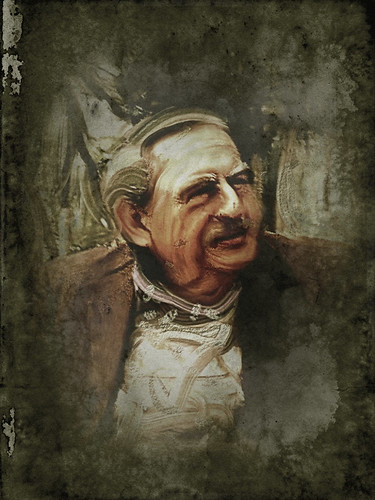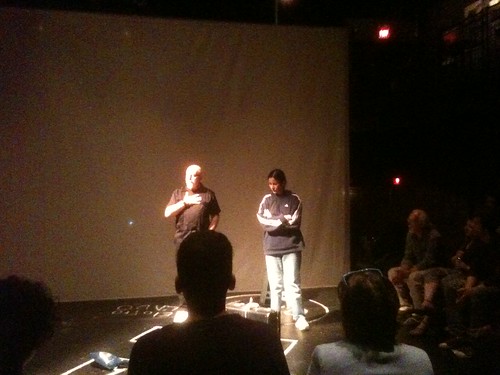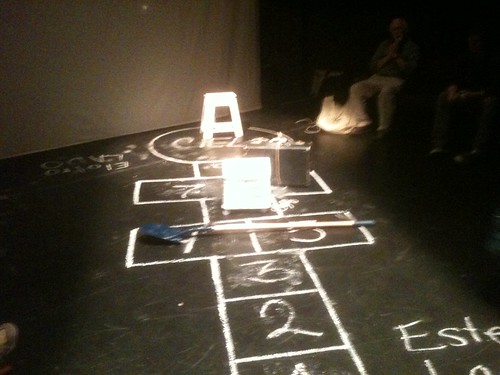Note: This text was read in its first version, in Puebla, during the first tribute to González Caballero's just days after his death in May 2003. Now I return to it on the ninth anniversary of his death.
 |
| Antonio González Caballero (Digital Work Over Photograph. © Gustavo Thomas. 2011) |
González Caballero, father. *
The strength of actions in real life can overwhelm us. González Caballero has had a more than decisive influence in all of us and we react to that; don’t let that overwhelm us. Now that he is dead, let’s not look to chronology to make a good biography... "Enumerarlo, seguir
el orden de sus días, me parece imposible; mejor buscar su eternidad,
sus repeticiones. Sólo una descripción intemporal, morosa con amor,
puede devolvérnoslo." ("To enumerate him, to follow the order of his days, seems impossible to me; let’s search his eternity, his repetitions. Only a timeless description, delinquent with love, you bring him back to us".) writes a young Borges in his text on the life of poet Evaristo Carriego.
I
To transmit by necessity, due to a continuous work within the tradition of Taoist-Tibetan meditation where you learn to give, to offer yourself completely to others, to the world, beyond fame or recognition ...
Giving was, for González Caballero, the main driving force in his life. He was always, without question, the teacher that gives.
González Caballero gave freely, gave to everyone; he painted and gave, he wrote and gave, he researched an acting technique and gave.I am not talking of the friend ...
What I can say about what the friend gave?
González Caballero was teacher of three disciplines during his life: the Science of Mental Physics, painting and acting.
He was convinced that drama should not be taught, but that by reading and writing a playwright would evolve; that was a somewhat misleading observation as in each of his classes, in each of his talks, he spoke of what he had read, analyzed it, transformed it, he listened to our writings, he commented them, he scolded us for gross errors. He taught drama too, so, in his very particular style.
From adolescence to his first studies of painting on a commercial level, González Caballero was for others a talented artist full of uncertainties and destructive impulses. In the 50's, after his encountering Tibetan philosophy in the Western version taught in Mexico by Pedro Espinoza de los Monteros, González Caballero experienced a radical change in his life and in his concept of giving. The strength that work gave him and which he shared for nine years led him, among other things, to enter fully into the teaching of painting, to create a learning method based on research that made Paul Klee and Vasily Kandinsky so famous as teachers during the German Bauhaus in the 20’s. From this method in his first school came out some renowned Mexican painters and cartoonists.
That same practice of giving continued changing his life, he entered with tremendous success in drama and through some accident of fate landed in the actors creativity class of the Andrés Soler School, of the ANDA (Asociación nacional de actores). Being a painter and writer González Caballero did not know the secrets of the art of acting, and with humility, depth and genius he went into it. In 1971 he created his first acting workshop from which his acting technique sprang along with dozens of actors with his stamp; this workshop never stopped until the day of his death, literally.
II
In what I call his unique way of transmitting knowledge, González Caballero was for most of us "a teacher" that, as I said earlier, was always teaching something. We called him just so, the teacher. The person who called him Toño, and that was a special case, did so because he considered him his trusted friend and yet, when visiting him, he didn’t leave without learning something from him, from his work; "Toño", the friend became a teacher too.
A class with González Caballero was a game, yet one sensed it was something much deeper, sacred at times; there was always humor, a certain ease of manner and abstraction; his prodigious use of imagination was transmitted to the world and one came out of his sessions with a drive to create, as if the imagination of the old man might have infected us so that all we needed was to get home so that in solitude this idea that emerged from his talk, his gestures, his giving, could take form. When González Caballero taught there was truly something from which you could absorb, it was impossible not to; when the teacher spoke, there was something to imagine, and in the end, always, something to create.
I will also be cautious, someone will comment that they did not learn with him, that he was boring or annoying, and they are entitled to say that; but now I can be less cautious and say, surely this wrong perception was because of prejudice against his personality, his way of dressing, his attitude to money.
González Caballero shouted, he shut people up, he hit tables to draw attention forcefully, he cursed, and right after he would smile as if nothing had happened, and just like that he would extend you his five fingers held together in his very original greeting.
In this loving and paced account of my experience as a student I remember how awesome it was for me that a man of his short stature, thanks to his attitude, with a voice strangely both high-pitched and hoarse, became so big in class. For those who worshiped strong personalities, González Caballero was just a scruffy unimportant person, we should picture him now that he’s gone: he used to closed his eyes when speaking to concentrate; even until the 90’s he smoked his Delicados (a brand of cigarettes) and part of his mustache remained burnt and yellowish from the tobacco, as well as the fingernails on the fingers that handled the cigarettes; his non-existing teeth and yet his normal talking (he took pride in his speech technique, which prevented him from sound senile, I remember): his glasses and the mark that they left on his nose; his broken nose ridge and his finger opening one nostril more than usual to breathe better; the jacket he never stopped wearing (when it rained, he liked wearing it, because he said it got washed that way); also the baggy dirty trousers he wore all the time; his vagabond shoes; his beard unshaven for days... Yes, that personality didn’t receive much respect, and yet, knowing it, he didn’t seeking to impose respect for his person, he did not complain for not getting it, he was there, teaching, he changed our lives in acting, we gave us the weapons to survive in it.
A friend from the theatre company I had back then, Esférica Ludens, days before the teacher died, wrote to me in an e-mail: "I must hurry because I want to absorb González Caballero, his classes are like ground gold to me." I believe that, I have a some of that gold shining on my hands.
González Caballero was always on time, but that did not mean that he began to talk about the class’s subject on time, everything happened in a simple manner, we entered the subject and the exercises by chatting. His workshop used to begin, for years, whether a Saturday or a Sunday, at eleven o'clock, and the exercises could start at 12 or 1 pm, but you never felt like you were wasting time; in the end, you were near him.
At that time that I remember now, in the late 80's, the sessions were in a large room on the roof of the house of the teacher Roman Calvo, who provided the workshop with a space for several years; there I had my first lessons in dramaturgy, with them two and some colleagues reading my plays after the workshop on Saturdays; they were small gatherings indeed. After lunch at just any restaurant we had to return to the house of the teacher, to listen to whoever was reading a text, to talk, to go to the movies. With González Caballero we had entire weekends of continuous learning and enjoyment.
One went there to learn to act, but you also learned philosophy, film (in this he was an expert), literature, psychology, history, the gossips around that history, freedom, you learned with him to be free. That's why I am convinced that some rejected it, they were afraid their freedom, they couldn’t be free, never more so than him.
Everything went the same way until the end of his life, the headquarters of the workshop changed but the routine of learning and enjoyment remained.
III
With him I learned a new concept of the word rebellion, and it did cost me effort and jobs to learn it: why shout? why break all paradigms in front of others? In your life, in your work, in your simple walking you can be free, that is the greatest rebellion and he taught that with absolutely nothing more, just by living, by being near us, by becoming our friend.
González Caballero always read for his own pleasure, but that continuous reading refreshed his work, his lessons, there was always something new that reinforced his work, and everything was so deep, so elevated, that sometimes we did not realize it; he was a simple, smiling person, simple, very simple. When reading of Taoist Oriental teachers you can get an idea where his mastery came from.
We used to invite people from outside the laboratory, people who had been surprised by our evolution, by our culture, we told them that we owed it to the teacher, and then they wanted to meet him; they certainly used to be excited to meet the teacher, and when they saw or heard him, or even when they read his work, few, very few praised him; most of them thought we were the great ones and that we were obsessed, deluded by him into thinking that he had given us things that we had really learned on our own. Fools, fools, fools!
González Caballero, with the vagabond look he had, is actually the father of a vast generation of actors and artists in this country, he is the father of an acting technique that is used, whether well or badly, by dozens of young actors, he is the father of some playwrights, among which I include myself, he is the father of theater teachers... González Caballero had no biological children but he was an indiscriminate father of artists, he never used a condom to teach, he was a libertine when giving, to everyone, to anyone, he did not respect anything or anyone.
Grotowski was right, we all have an artistic father and we can not dismiss this indisputable fact, González Caballero is ours and like it or not he is in us: "here, in my heart; here, in my mind; here, in my creativity," he, as per the eternal chorus that follows the death of someone, is not dead, he lives in us.
Finally, as I wrote some years ago when I said that we, his students, while the teacher was still alive, had already killed him because we did not accept his paternity nor defended it against the onslaught of the culture moguls of our country, I repeat: I was so many years with him and still am, because González Caballero did what he said, he did not lie; that I have not found anywhere else in my country and maybe that is why I now live thousands of miles away from him and do not suffer in his now eternal physical absence.
It doesn’t matter that Mexican critics take him as one of the worst famous writers of our theater! It doesn’t matter that the directors are so unprepared that they fail to understand his proposals and his colleagues minimised him to such an extent that he just seemed a naive person saying nice things! Of course, nothing further from the truth.
But, let’s remember, González Caballero was not dead in life because of those people who attacked or minimized him, but because of his own students, his disciples and those who called themselves his friends. Before anyone jumps up to say I’ve offended them, I can wash my hands off my "I accuse!" Let me clarify: not everybody.
Surely there are very few here, far fewer at his funeral, who speak of the importance of his creative work, not about him having written several books and that they all should be published, but about the real importance of his art... I didn’t need to have been there to know it. It’s normal, the friend, the man, had died... maybe it wasn’t the right time to talk about that... I don’t know, I have my doubts.
I think that those who buried him alive before that terrible afternoon in May 2003 did not understand that the struggle for recognition of the old man was not for González Caballero or his work but for themselves: once truth has been transmitted it does not belong to the teacher but the students, it’s in their blood, it’s part of it. The open doors became part of their own constitution, of their creative interests, the teacher had placed himself within them. Actually they buried themselves by not giving him the respect he deserved, by not by analysing his texts, by not reading him in depth, by lowering their research, by not developing their own creativity in the light of his teachings. The father's death is inevitably the death of the child.
At the end of this loving and ruthless account let’s not lose that part that he left in us, let’s learn to give as he gave, let’s accept his paternity over us and raise our creation as he did with his own; then, let’s be free.
Like with every artist that disappears, and that is something that González Caballero has unquestionably done, "disappear", let’s try to bring him back to life in a real place in our lives, through his creative work that still runs through our veins.
Greetings to all from Beirut, where thanks to God not much theatre is done.
Gustavo Thomas
Beirut, Lebanon
June 2003
(Reworked in Toronto, Canada. May 2012)
* Translation from Spanish by Tadeo Berjon.
Texts, photographs and videos in this Blog are all author's property, except when marked. All rights reserved by Gustavo Thomas.
If you have any interest in using any text, photograph or video from this Blog, for commercial use or not, please contact Gustavo Thomas at gustavothomastheatre@gmail.com.






